Posts Tagged ‘Tina Hall’
Tina Hall Interviews Ian Graham
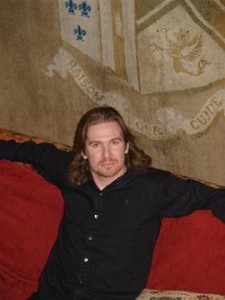 Ian Graham wrote his first novel, Monument, in 2002. The prequel is currently in the works. He resides in Manchester, England. Ian has First Class BA (Hons) in Literature from Bolton Institute and an MA in British Romanticism from the University of Manchester.
Ian Graham wrote his first novel, Monument, in 2002. The prequel is currently in the works. He resides in Manchester, England. Ian has First Class BA (Hons) in Literature from Bolton Institute and an MA in British Romanticism from the University of Manchester.
Can you tell us a little about your background? Where are you from? How has your background influenced your writing style?
I grew up in Bury, in the northwest of England. Nowadays, I live a couple of miles up the road in Ramsbottom, a small town crouching at the edge of the West Pennine Moors. After leaving comprehensive school, I pretty much failed my A-levels, then had an abortive attempt at becoming a computer programmer. During this time, I began to read, primarily for escapism; gradually, I realised that I would like to try my hand at writing. I set about getting a literary education, studying Literature at Bolton Institute, then moving on to a Master of Arts at the University of Manchester. The Masters in particular was hard work. But incredibly nourishing.
Since childhood, I’ve lived in areas that are fairly green and, if not directly rural, were at least in close proximity to areas of farmland. This, I am certain, has had an impact: I suspect that I was drawn to the fantasy idiom because of the vast natural landscapes popular within the genre. I walked to and from school through farmland every day during my adolescence. During my dinner break, I’d wander through the overgrown ruins of the local cotton mills which, reduced to rubble, struck me as being less the residue of an industrial age as something leftover from a far more distant era – an era existing before electrical gadgets, street lighting and other modern day paraphernalia. No doubt, this got my imagination working. I think, too, there was something in the air where I was raised: for many years, my next door neighbour was the artist Vinnie Chong and, unbeknownst to me, the SF/F writer Andy Remic lived a few hundred yards down the road.
When did you first become interested in writing?
The creative writing classes were the only remotely pleasurable lessons at school; yet I never considered writing with any dedication until much later. I spent my teenage years attempting – and failing – to learn to play the guitar. I rarely read; I rarely watched television, or did anything other than make a ghastly, ear-popping racket with my electric guitar and deeply unimpressive 5 watt amplifier. When it became apparent that I was never going to give Ritchie Blackmore a run for his money, I tried to find something else to do. Computer programming seemed the sensible choice at the time but I hated the subject and the jobs it led to. As I mentioned above, I began reading earnestly at this time, primarily to take my mind off the dissatisfying aspects of my life. The more I read, the more I gave thought to writing. In December 1992, I attended a 5 day creative writing course, in which the writer-in-residence was the late great David Gemmell. He said that I showed some promise, and took me under his wing. From then on, writing was a serious concern.
What was the first story you ever wrote?
Like many writers, I began innumerable stories that never reached a conclusion. The first story I finished, and submitted, was a short horror/fantasy piece, whose name I cannot recall. I sent it to Interzone; they replied with a courteous, and encouraging, rejection letter. After the David Gemmell course, I dashed out a 250,000 word novel in about three months. It was written with more vigour than ability, but it was a start. The book, incidentally, was called Monument – though it bears no resemblance to the published novel of the same name.
Do you have any advice to offer others who would like to pursue a career as an author?
Brace yourself! Most writers, when describing their writing lives with complete honesty, sound as if they are whingeing. But, in truth, it is incredibly hard work. You’ve got to be resilient, self-disciplined, self-critical and generally quite tough. As a breed, writers tend to be sensitive and neurotic; these may well be the traits that drive a writer to write. But they also lead to much agonising, self-doubt, sleepless nights and host of other self-inflicted woes. The key is to be persistent, I think. Labour on, day after day, no matter how low your confidence is or how badly the writing seems to be going. Encouragement from others can be helpful; but ultimately, it’s all down to you.
Certain practical things are important. To begin with, read. A lot. Fiction, non-fiction, poetry, prose; consume as much as you can, think about what you’ve read, pay attention to the techniques other writers employ. And read beyond your chosen genre, too. If you write fantasy, don’t read only fantasy; gobble up the classics and stuff from other genres. The most unexpected sources can provide some of the best inspiration. You mustn’t be afraid of rewriting, either; first drafts rarely emerge fully formed. They usually need revising, to various degrees. Don’t expect to enjoy writing as you would, say, watching a movie or going on holiday; it tends to provide long-term gratification rather than short-term thrills – though they do crop up from time to time.
Can you tell our readers a little about Monument?
Monument is set in the medieval world of Druine. Politically, Druine is a theocracy, governed by the Pilgrim Church. On the whole, it is a thoroughly unpleasant place, and getting worse by the day. Anhaga Ballas, the story’s protagonist, is a drunk, vagrant and thief. When he steals an unusual gemstone-encrusted oddment from a museum, he suddenly finds himself pursued by the Church for reasons he cannot fully comprehend. He decides to take refuge in Belthirran, the fabled Land Beyond the Mountains. But the journey there is long and Ballas, never the most wholesome of fellows, gets up to some very nasty things indeed . . .
You are currently working on the prequel. What can your readers expect from that? When do you think it will be available?
In the prequel Ballas is, of course, much younger. He is yet to acquire the potentially murderous alcoholism of his later years; consequently, he is stronger, faster and more quick-witted. He also exhibits a few faint traces of decency, which seldom appear in Monument. But I must be careful: if I say too much, I might reveal information best disclosed after having read Monument . . .
Who are some of your favorite authors? Why?
Crikey. There are so many! Within the genre, David Gemmell was a huge influence. I don’t know of any writer who can write a fast-paced, emotionally engaging story as well as David could. Tad Williams is also an influence: his prose style is amongst the powerfully evocative I’ve encountered. Philip K Dick is consistently mind-bending; he had a rare knack of changing the way a reader views the world.
Amongst the current crop of genre writers, I have an (albeit grudging!) admiration for my friend, Andy Remic. He produces first rate fiction, in several genres, and has a workrate that is simply astonishing. The horror writer Gary McMahon is dazzling; his debut, Pretty Little Dead Things, is one of my favourite horror novels of all time and has an emotional impact seldom found in fiction of any sort.
Outside the genre, I have too many favourites to list. Dostoevsky, Graham Greene, Dickens, Shakespeare, Conrad, Nabokov, Cormac McCarthy . . . I also read a lot of poetry. Ted Hughes’ work was particularly affecting. So too Wordsworth and Keats . . .
What one subject that you have yet to cover would you most like to bring the public next?
Oh gosh! There’s a question . . .! For myself, writing tends to be a largely instinctive endeavour, and the subject – that is, the theme underpinning the narrative – only becomes apparent during the latter stages of writing any piece. There tends to be a moment when the clouds part, the sun shines, and I think, Ah, that’s what I meant! So don’t have any predetermined subjects as such. I just plod on and see what emerges . . .
Are you yourself a fan of the horror/sci fi genres? Did you have any favorite monsters as a kid?
When I was growing up, I devoured pretty much any horror VHS I could get my hands on. And during the summer holidays, I ploughed through James Herbert’s works at a rate of knots. I was inordinately fond of the movie Hawk the Slayer too. At primary school, I manufactured little Hawk comic books on pink paper towels plundered from the toilets. Nowadays, I read a lot less fantasy than I used to. No doubt, this is because I spend so much time writing it. And I don’t tend to read a huge amount of fiction, at least when I’m working on my own stuff. I like to keep my head clear, as far as I can; I suspect I am missing out on a great deal of excellent material, which saddens me a little. At present, I tend to read non-fiction, either for research or general enlightenment!
I can’t recall having a favourite monster. But I do remember being chilled by a trailer for The Blob. The thought of being smothered by that ghastly ooze was intolerable; maybe it connected with my childhood fears of drowning and asphyxiation . . .
What is the best advice anyone has ever offered you?
As hackneyed as it may be, Work hard, play hard is a pretty sound philosophy. If you work too hard for too long, you dry up; the joy vanishes, and the work itself suffers. So you have to cut loose now and again. Equally, you must know when the time for play has stopped and the hard graft must resume . . .
What are you planning to work on after the prequel to Monument?
There will be another fantasy novel, set in a different world to Druine. Also, I am working on a piece of contemporary fantasy/horror; a bit of a departure, but we’ll see how it goes . . .
Tina Hall Interviews Kinuko Y Craft
 A graduate of Kanazawa College of Art in Japan, Kinuko Y. Craft came to the United States to continue her study of Art at the School of Art Institute of Chicago in the early sixties. Her work has graced publications like Playboy, Time, and The New York Times Magazine to name a few. And on books by Stephen King, Isaac Asimov, C.S. Lewis, Tanith Lee and Andre Norton. Kinuko has works in the permanent collections of The National Geographic Society, The National Portrait Gallery at The Smithsonian, The Cornish Colony Museum in Windsor, VT,and The Museum of American Illustration, New York City. Craft’s work has gained her numerous awards in her field. Her works appear on countless licensed products. Influenced by the works of Leonardo Da Vinci, the Pre-Raphaelites and Symbolist painters, she is without a doubt one the best and most well known fantasy artists of the day. Her works offer serene comfort and remind people to take time to appreciate the beauty in all things.
A graduate of Kanazawa College of Art in Japan, Kinuko Y. Craft came to the United States to continue her study of Art at the School of Art Institute of Chicago in the early sixties. Her work has graced publications like Playboy, Time, and The New York Times Magazine to name a few. And on books by Stephen King, Isaac Asimov, C.S. Lewis, Tanith Lee and Andre Norton. Kinuko has works in the permanent collections of The National Geographic Society, The National Portrait Gallery at The Smithsonian, The Cornish Colony Museum in Windsor, VT,and The Museum of American Illustration, New York City. Craft’s work has gained her numerous awards in her field. Her works appear on countless licensed products. Influenced by the works of Leonardo Da Vinci, the Pre-Raphaelites and Symbolist painters, she is without a doubt one the best and most well known fantasy artists of the day. Her works offer serene comfort and remind people to take time to appreciate the beauty in all things.
What was it like growing up in Japan?
I walked to school every day so I could feel the seasons change. The only “violence” I knew was fighting with my siblings by pulling their hair or throwing sticks at each other. Small town life in Japan was peaceful, safe and the streets were always filled with people walking. Almost no one had cars. We all rode the train or a bus when we had to go to the next town.
Did you always have a love of art? What led you to pursue a career in the field?
My grandfather was an art lover and a master calligrapher. He had a collection of books on Western Art. They fascinated me and I poured over their pages endlessly. He also had a print by Maxfield Parish called “Stars” which I fell in love with. I painted and drew when ever I could and even stole my sisters set of Craypas once while she was in school and painted a mural on a sliding door in the living room when nobody was there.
What was going through your mind your first day in the United States?
I arrived by passenger ship in San Francisco in January of 1964. That part was exciting and invigorating. The City was beautiful as I had expected. However the American Cultural Center in Kanazawa (The city where I went to Art School) had recommended that I take the bus from San Francisco to Chicago to better “See America.” The cold, bleak landscape, miserable food and the uncleanliness of the bus terminals were nothing like anything I had expected. There was and still is nothing like it in Japan that would have prepared me for the experience. It was terribly disappointing, but once I arrived in Chicago I knew I had made the right choice.
Did you ever think back then you would have become as successful as you have?
First of all, I don’t think I am successful. I don’t know what it is in my case. I only knew then that I wanted to paint and would let
nothing stand in my way to make that happen. Besides, I have never thought I have achieved anything bright artistically. All I can do is what I do. It’s like trying to climb to the top of a ladder that has no end.
A lot of your work has involved fairy tale/mythological themes. Were you always drawn to those things? Do you have a favorite story from either of those genres? Why do you think such tales are timeless in their appeal?
They are the culmination of human wishes, dreams and hope. I feel the imagination expressed in them is something we must have to go through life. As a pre-schooler, I always asked for anyone around to tell me stories. I heard folk tales, legends; and ghost stories so scary they made me afraid to go to the bathroom at night. After I started school and finally could read, I found a book titled “Greek Myth for Young Readers” in my father’s pile of old books. About the same time, a grade school friend loaned comic-book versions of the Iliad and the Odyssey. It opened me to a dreamworld I had never known. They have guided me into a world of literature and imagination which fuels my soul as an artist.
You have produced covers for such authors as Tanith Lee, Isaac Asimov, Stephen King, and Andre Norton. What is it like to see your work complement the works of such talented authors?
I don’t really think about it. I’m not into fame. They are all phenomenal writers who’s stories offer plenty of fodder for visual interpretation. Fortunately, I pret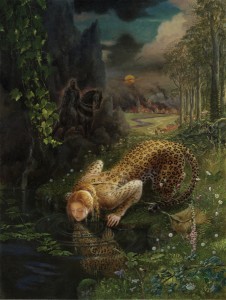 ty much do what ever I like. So far none have complained, thankfully. They make wonderful reading in the bathtub.
ty much do what ever I like. So far none have complained, thankfully. They make wonderful reading in the bathtub.
What it is like to work with your husband Mahlon F. Craft and daughter Marie Charlotte Craft? Do you find yourself more inspired when working with your family?
Mahlon does everything I don’t. I paint, do the laundry and dishes and cook for our dog. Mahlon does everything else. We enjoy working together on books because we can collaborate as author/designer and artist. There are no bruised egos if I ask him to change a scene so it better fits what I want to paint. My daughter was coached by editors when writing Cupid and Psyche and King Midas and the Golden Touch. She has a degree from Columbia University in Literature. I hoped writing professionally might be something that would take on her, but it didn’t.
You have contributed to several children’s books. Do you enjoy that?What does it feel like to have the chance to inspire future generations to dream and create?
I’m not sure what you mean by “contributed.” In all of the books I have illustrated, mainly I am left on my own and my charge is to
create art that does justice to the story, while entertaining me as a painter.
What one subject have you yet to cover that you would most like to?
A ghost story–something mysterious, dark and beautiful.
What is one little known thing about yourself you’d be at liberty to share with our reader’s?
Nothing, really, except that I am insanely fascinated with big canines..
What advice would you offer the artists of tomorrow?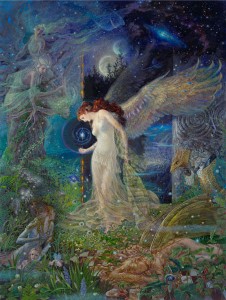
Be prepared for the world you know as a student to change in ways you can’t even begin to dream of. Drawing skills are basic to all forms of visual art. They are the tools of the trade, and being facile as a draftsman will allow you to adapt your output and nurture your imagination to move with markets that are sure to change in the future.
What do you think you would of been if not an artist?
I don’t know. Maybe I would have been born as a sea shell, or plankton, a cloud, or wind.
What do you like to do in your spare time?
Just moping around aimlessly, or picking ticks off of my dog Wolfgang and some reading.
What projects are currently working on?
I have two mural designs to complete as paintings which will be enlarged into glass mosaics. It’s been a trying assignment because there are many people involved on the client side and their opinions had to be considered as the designs evolved. After that I will
complete the work on illustrating a Christmas story Mahlon wrote about 11 years ago for publication in 2012. And I have to provide enough finished drawings for an exhibit at my gallery sometime next year. Next I have to finish Beauty and the Beast which I started 8 years ago and haven’t touched since.
How do you hope to be remembered when your time comes?
As an artist inspired by beauty who’s best painting will always be the next one. On the other hand, I live and think for the moment. I don’t much think about what will happen after I’m gone. I won’t hear it nor care, perhaps, but I do hope to meet all of my dogs there.
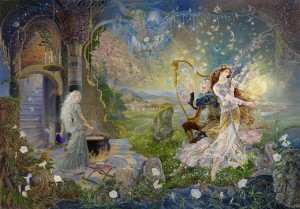 Where can your fans go for the latest on your career?
Where can your fans go for the latest on your career?
So far, just my web site. I’m not a computer user, nor am I interested in social networking. Posting to a Facebook page or on
Twitter would be pure drudgery for me–and that’s the truth. If I ever do either of these things, it will be through Mahlon, though he’s
already overloaded with work.
Tina Hall Interviews John Everson
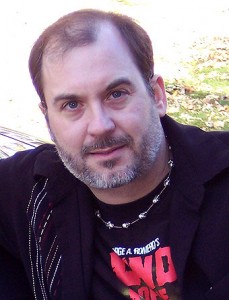 John Everson is well-known for his novels (Covenant, Sacrifice,The 13th, and Siren). Covenant gained him a Bram Stoker Award for a first novel and his short stories appear in several collections and well over 50 magazines. His latest novel is Siren. John is also co-founder of the publishing company Dark Arts Books, where he works tirelessly assisting with editing, providing cover artwork, layouts and promotion of the company. It is said when he wishes to escape from writing he can be found in his hidden studio recording pop/rock songs.
John Everson is well-known for his novels (Covenant, Sacrifice,The 13th, and Siren). Covenant gained him a Bram Stoker Award for a first novel and his short stories appear in several collections and well over 50 magazines. His latest novel is Siren. John is also co-founder of the publishing company Dark Arts Books, where he works tirelessly assisting with editing, providing cover artwork, layouts and promotion of the company. It is said when he wishes to escape from writing he can be found in his hidden studio recording pop/rock songs.
Can you tell us a little about your beginnings? As a child where you always drawn towards what would later become your career? Do you recall what the first story you ever wrote as kid was about?
As a kid I was a voracious reader, especially of anything fantastic. Growing up I read all the standard kids series — Hardy Boys, Nancy Drew, Tom Corbett, Space Cadet — but I quickly graduated to Golden Age sci-fi novels from Isaac Asimov, Robert Heinlein, Clifford Simak, Poul Anderson, and more.
I loved the twisted macabre-tinged sci-fi of Richard Matheson, and his short fiction in particular was probably a huge influence on my writing. But the first story I remember writing as a kid was a space opera set in Isaac Asimov’s Foundation universe. Thankfully, that one is long lost in a landfill.
When did you first know you wanted to become a writer? What did it feel like to learn you can actually make a living doing something you love?
I always knew that I’d write in some sense. In grade school and high school I wrote a lot of song lyrics (and songs) along with poetry and short fiction. Somewhere along the way I decided I’d go into Journalism and work for newspapers, which I did. I quickly found though that I really preferred the “fluff” writing over anything related with actual news. So in college I worked a lot on the features side of the newsroom, doing celebrity interviews and album reviews. Back then I interviewed everyone from Jay Leno to the Throwing Muses. I even wrote a TV column at one point. That carried on after college — I left my first job at a suburban newspaper
to work for a music magazine (though I kept writing Pop Stops, the weekly music column I started at the newspaper for the next 20 years as a freelancer). Those early years at the newspaper and the music magazine are when I first began publishing short horror fiction regularly as well. Eventually I took a job in trade journalism so that I could actually pay the mortgage, so I must say that the writing that I most enjoy doing still does not pay the bills.
Does your son share your passion for written word? Do you find him to be much like you? I hear he likes to hear you play an acoustic guitar. Do you enjoy times when you get to take a break from your work and indulge him that?
My son has had a love for words from the start. I dedicated my short fiction collection Needles & Sins to him because of his love for stories. He knew his alphabet at 17 months and just today we came back from the kindergarten parent-teacher conference to find that he’s reading a year beyond his peer group. So yeah, in his love of words and music (and stubbornness), he’s a lot like me. And I love to share songs and music with him. Music is probably the biggest love of my life, and he seems as enamoured with it as I have always been. That’s pretty cool to see.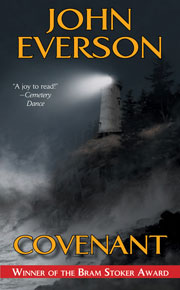
What kind of music do you make there in your hidden studio lair?
Not much, unfortunately, these days. I’ve been so focused on writing the past couple years, that I’ve really not played much at all. I do love to write pop-rock songs though. Nothing makes you feel better than a really hooky, well-produced pop song!
What does it feel like to win the Bram Stoker Award? Do you enjoy his works? Which of his works do you feel was his best?
The Bram Stoker Award is given out annually by the Horror Writers Association to recognize achievement in the field. It’s voted on by other horror writers — your peers — so it was really amazing to win that award. I actually had gone to the award ceremony that year simply to network… so nobody was more shocked than I was to find out that I won!
As for Bram Stoker himself? The only work of his I’ve read was Dracula, but that novel I read 2-3 times in high school. I loved it.
What was the best advice anyone ever gave you?
Go ahead and write fiction if you can’t not do it. But don’t quit your day job.
Do you prefer to write novels or short stories, or do you like them both equally?
I like the instant gratification of short fiction, because you can start and finish a short story in the same day. It’s nice to have to have a completed piece of work in that short of a time. That said, when you finish a novel,it’s really a monumental feeling because it’s so much work to write one. Over the past few years I’ve definitely grown to focus more on novels, which allow you to expand and tell a more complex a story than short fiction does.
What do you think you’d be doing if you hadn’t became a writer?
Well… currently my day job is involved with creating websites for online education. So… I suppose I might be doing that whether I became a fiction writer on the side or not. Or maybe I would have gone completely batshit crazy, quit the conservative comfort of my day jobs and gone out on the road as a rock musician. A guy can dream…
Do you enjoy providing the artwork for covers? Is there any one cover you have worked on that you love most?
I kind of  backed into creating bookcovers. It started when I tried to help out a small press that was publishing an anthology that I had stories in. I wanted to help make the cover a little better than their original, and the next thing I knew, I was designing the next half dozen releases for them. That led me to founding Dark Arts Books (where I also do the covers) and to doing a line of small hardcover chapbook covers for Delirium Books. Nearly all of my covers feature photo collages of photos I’ve taken, and my
backed into creating bookcovers. It started when I tried to help out a small press that was publishing an anthology that I had stories in. I wanted to help make the cover a little better than their original, and the next thing I knew, I was designing the next half dozen releases for them. That led me to founding Dark Arts Books (where I also do the covers) and to doing a line of small hardcover chapbook covers for Delirium Books. Nearly all of my covers feature photo collages of photos I’ve taken, and my
favorites are probably Spooks! and Failure, which feature images of my wife and Like A Chinese Tattoo and Suckers which feature LA model Jade Paris.
You can see most of my cover and website art work at http://www.johneverson.com/artwork.htm
Other than Alan Clark what other illustrators do you admire?
Travis Anthony Soumis has done the book covers for my last three full-length small press hardcovers, Needles & Sins, The 13th and Siren. I really love his style, and adapted the imagery from Needles & Sins to serve as the focal banner on my website.
Are there any of your works that hold more personal meaning for you?
Siren and Needles & Sins are probably my most personal novel and short story collection, respectively. Siren because it deals with the fear a father has for losing his child (the lead character is haunted by the death of his son which he watched and couldn’t prevent) while the collection includes stories that really touch on some of my deepest emotions.
Why do you think people are so drawn towards the darker side of things?
We all are afraid of the dark… so more than anything else, we want to know what’s hiding there… perhaps in the knowing, we can conquer our fear.
What is one subject you’d like to cover that you haven’t had the chance to yet?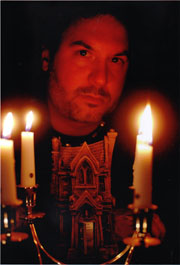
Honestly… I don’t suppose there is one that I haven’t touched on yet. I’ve been publishing fiction now for nearly 20 years. I’ve written 5 adult novels(one to be published next year as The Pumpkin Man) a young adult novel about goblins and witches and kids (currently being edited so that it can be shopped) and four short story collections that hold nearly 60 stories between them. There are still stories I want to tell… but my key themes have consistently been obsession and erotic horror. And I’ve done those a lot!
What works are you currently working on that you are most excited to get out there to the people?
(I just turned in my fifth novel The Pumpkin Man a couple months ago, so I’m pretty excited about that, though it won’t be out for at
least 10 months. I’m also about to start edits on my young adult novel, tentatively titled A Gathering of Goblins. So I’m looking forward to polishing that so that hopefully my agent can find a good home for it where lots of kids will have the chance to read it. Because in the end, that’s why I got into writing in the first place — to provide others the same kind of enjoyment that I found in books when I was a kid. It’s kind of all come full circle.